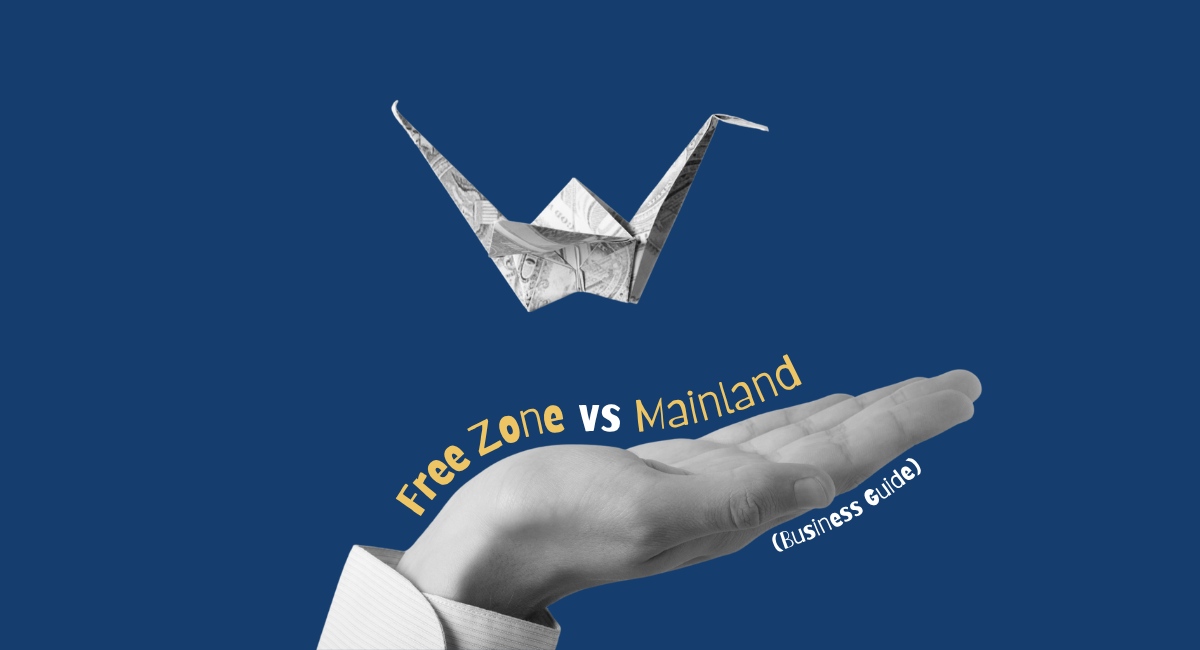Importing into the UAE: Free Zone vs Mainland (Business Guide)

Importing into the UAE isn’t just about getting goods past customs. It’s a strategic choice that affects how you pay duties, claim tax benefits, and even how your company is structured. For entrepreneurs and business setups alike, the big decision is, do you bring goods into a free zone, or do you import directly into the mainland?
At first glance, the difference looks like a matter of location. In reality, it’s about compliance frameworks, tax obligations, and business setup models. Let’s dive in, using the latest data and official guidance from the UAE government, customs authorities, and tax regulators.
Let’s break it down.
Table of Contents
Toggle1. The Basics: Customs and VAT
No matter which route you take, some numbers apply across the board:
| Charge | Rate / Rule | Notes |
| Customs Duty | 5% of CIF (Cost + Insurance + Freight) | Higher for alcohol, tobacco, etc. |
| VAT | 5% standard rate | In Designated Zones, certain supplies of goods may be treated as outside the scope of VAT if the goods aren’t consumed in the zone. Services remain subject to VAT as usual. |
| Preferential Tariffs | Varies | GCC Customs Union and CEPA trade agreements may reduce or remove duty, but only if the goods meet the rules of origin requirements under each agreement. |
These are managed through emirate-level customs authorities under the oversight of the Federal Authority for Identity, Citizenship, Customs & Port Security (ICP).
2. Importing into a Free Zone

The UAE has 40+ free zones (like JAFZA or SAIF), each built to encourage foreign investment. Importing into a free zone means you can:
Why businesses choose free zones:
- Duty suspended while goods stay in the zone.
- Easy re-export to GCC or international markets.
- 100% foreign ownership allowed.
- Some zones are classified as “designated” for special VAT rules.
Things to keep in mind:
- Move goods into the mainland = duty + VAT apply immediately.
- A Qualifying Free Zone Person (QFZP) may benefit from a 0% corporate tax rate on qualifying income if substance and reporting requirements are met. Non-qualifying income, including many mainland transactions, is taxed at 9%, though some specific activities may still qualify for 0%.
- Compliance and reporting are stricter than many expect.
Best for: logistics hubs, bonded storage, re-exports, and manufacturers with an export-heavy focus.
3. Importing into the Mainland
Mainland import is the more direct option, but less flexible than free zones.
Why businesses choose mainland import:
- Duty (5%) and VAT (5%) paid upfront.
- Once customs duty and VAT are paid, the goods are cleared for free circulation within the UAE and across the GCC Customs Union.
- A mainland business license lets you sell directly to customers, big retailers, and the government.

For companies focused on retail, wholesale, or B2B sales inside the UAE, mainland import is usually the straightforward path. Think of supermarkets stocking foreign brands, or construction firms sourcing equipment, they all go through mainland import channels.
Challenges:
- Must hold a mainland trade license.
- Documentation is strict: invoice, packing list, bill of lading/air waybill, and certificate of origin. Dubai Customs explicitly lists these as required documents, along with permits for restricted goods.
Best for: retailers, wholesalers, construction firms, and businesses selling mainly inside the UAE.
4. Free Zone vs Mainland: Side-by-Side
Here’s a quick comparison to make it easier:
| Factor | Free Zone Import | Mainland Import |
| Customs Duty | Suspended if goods stay in zone | 5% upfront |
| VAT | May not apply in designated zones Note: this exemption only applies if the goods remain in the designated zone and are not consumed there. Services are still taxable. | 5% upfront |
| Re-Export | Very efficient | Not the primary route |
| Selling in UAE | Duty + VAT apply at point of entry | Free circulation once cleared |
| Ownership | 100% foreign ownership | Mainland license required. Note: Many mainland activities now also allow 100% foreign ownership under updated UAE commercial laws. *Not all activities qualify, some strategic sectors still require a UAE national partner. |
| Corporate Tax | 0% on qualifying income (QFZP rules); 9% on mainland sales Note: Some mainland-related activities of free zones may still qualify for 0% if they meet QFZP rules. | 9% corporate tax applies |
5. Special Rules: Controlled and Strategic Commodities
Some goods require more than standard customs paperwork. Items like hazardous chemicals, dual-use equipment, or advanced tech fall under “controlled commodities.”
Requirements under Cabinet Resolution No. (97) of 2024:
- Register on the relevant UAE government portal.
- Secure import/export/re-export permits.
- Keep records for 5 years.
- Allow inspections when requested.
⚠️ Skipping these steps can lead to fines, seizures, or criminal charges.
6. Building the Right Support Team

Importing is not a solo job. Beyond logistics, you’ll need specialists who know the compliance landscape:
- Tax consultants / VAT consultancy services to help structure imports and advise on designated zone VAT rules
- Accounting services to handle customs duty reconciliation, VAT filings, and corporate tax adjustments
- CFO services if you’re scaling and need strategic oversight of import cost structures
- Company evaluation and ICV certification experts if you’re targeting government contracts or sector-specific incentives
- Liquidation advisors if restructuring or winding down free zone entities to move into the mainland
Each of these services is part of what keeps import operations compliant and cost-efficient.
7. Quick Compliance Checklist
Before shipping, make sure you’ve ticked these off:
- Classify goods correctly using the HS code and confirm duty rates on emirate customs portals.
- Confirm licensing — do you hold a free zone license, a mainland license, or both?
- Check VAT rules — is your free zone designated or not? Will your imports trigger VAT immediately?
- Screen products for restrictions — controlled, hazardous, or strategic items require permits.
- Assess tax implications — Free Zone Persons vs Mainland, corporate tax exposure at 0% or 9%.
- Document everything — invoices, certificates, permits, declarations. Customs authorities can and do audit.
Final Word
Importing into the UAE is less about “where the port is” and more about how your business is structured. Free zones give you flexibility for re-exports and certain tax advantages, but they come with compliance strings attached. Mainland import offers direct market access, but you pay duties and VAT upfront.
Either way, success hinges on doing the homework, checking tariffs, confirming VAT treatment, securing permits, and building the right team of tax consultants, accounting services, and compliance advisors. Cut corners here, and the penalties outweigh the savings. Get it right, and the UAE’s position as a global trade hub becomes your biggest advantage.
Disclaimer: This article is for informational purposes only and does not constitute legal, tax, or financial advice. Regulations in the UAE are subject to updates and may vary by emirate, free zone authority, and the nature of goods being imported. Businesses should consult with qualified tax advisors, customs specialists, or legal professionals before making decisions related to importing, VAT, or corporate structuring. The sources cited are official at the time of writing, but readers are encouraged to verify the latest guidance directly from UAE government portals and authorities.
Sources (official / verified):
- Rate of customs duty — The Official Portal of the UAE Government. URL: https://u.ae/en/information-and-services/finance-and-investment/clearing-the-customs-and-paying-customs-duty
- VAT Importers User Guide — Federal Tax Authority (FTA). URL: https://tax.gov.ae/DataFolder/Files/Pdf/VATImportersUserGuideEnglishV050.pdf
- Free Zones overview — Ministry of Economy & Tourism (MOET). URL: https://www.moet.gov.ae/en/free-zones
- Cabinet Resolution No. (97) of 2024 — Executive Regulation on Controlled Commodities. UAE Legislation portal. URL: https://uaelegislation.gov.ae/en/legislations/2583
- Executive Regulation of Corporate Tax (Oct 2024) — UAE Federal Tax Authority. URL: https://tax.gov.ae/Datafolder/Files/Legislation/Executive%20Regulation%20of%20Federal%20Decree%20Law%20No%208%20of%202017%20-%20Publish%20-%2004%2010%202024.pdf
FAQ
1. Which is better for importing products into the UAE – Free Zone or Mainland?
It depends on what you want to do with the goods. Free Zones are great if your focus is on re-exports, bonded storage, or regional logistics. Duties are suspended as long as the goods stay in the zone. Mainland import is better if your business is about retail, wholesale, or direct sales inside the UAE, because once the duty and VAT are paid, goods can move freely anywhere in the country.
2. Do I need a local sponsor to import products into the UAE Mainland?
Not always. Under recent reforms, many mainland business activities now allow 100% foreign ownership. However, some strategic or restricted sectors may still require a UAE national partner. The exact requirement depends on your trade license activity as listed by the Department of Economic Development (DED) in your emirate.
3. Can I import goods into a Free Zone and sell them in the UAE Mainland?
Yes, but there’s a catch. Once goods move from a Free Zone into the mainland, you’ll need to pay customs duty (5%) and VAT (5%) at the point of entry. At that point, they’re treated the same as goods imported directly into the mainland. So Free Zones are great for warehousing and re-export, but if your business relies mainly on UAE customers, mainland import is usually the more straightforward path.
4. What are the customs duties for importing into UAE Free Zones vs Mainland?
- Free Zone: No duty applies as long as the goods stay in the zone. If they’re re-exported, they can leave without paying UAE duty. But once they enter the mainland, the standard 5% duty (on CIF value) applies.
- Mainland: Duty is 5% upfront at clearance, plus VAT, after which the goods are in free circulation within the UAE.
5. Do I need an import license to bring products into the UAE?
Yes. To import goods into the UAE, your company must hold a valid import license — either a mainland trade license or a free zone license depending on where you operate. The license defines what type of goods you can import. For restricted or controlled products, you may also need special permits from government authorities in addition to your license.
